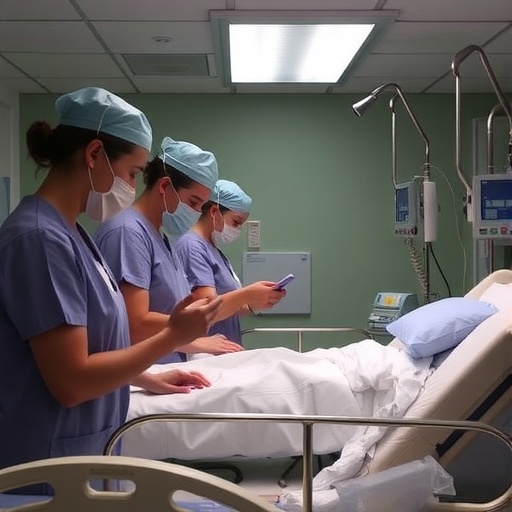In the critical and demanding world of healthcare, particularly within Intensive Care Units (ICUs), the approach to patient care can significantly impact outcomes. A recent study led by Wei and colleagues has illuminated the importance of understanding how nurses perceive and implement prone positioning within their practice. This innovative research paper entitled “Development and validation of a Knowledge, Attitude, and Practice Questionnaire Related to Prone Positioning among Intensive Care Unit Nurses” offers a comprehensive examination of nursing perspectives on this potentially life-saving technique.
Prone positioning involves laying patients face down to improve breathing and oxygenation, particularly in cases of severe respiratory distress. This method has gained traction in the management of patients with acute respiratory distress syndrome (ARDS), especially highlighted during the recent COVID-19 pandemic. The study by Wei et al. emphasizes the critical need for nurses to possess a solid understanding of the indications, benefits, and challenges associated with this technique. As frontline workers, nurses play an essential role in the application of prone positioning, making their knowledge and attitudes crucial for successful implementation.
The study’s questionnaire underwent a meticulous development and validation process, ensuring that it effectively captures the relevant dimensions of knowledge, attitudes, and practices concerning prone positioning. Researchers utilized both qualitative and quantitative approaches to refine the questionnaire, ensuring its applicability to various ICU settings. This step is vital as it establishes a reliable framework for assessing the current educational needs of nursing staff across different institutions. By addressing these knowledge gaps, targeted training programs can be developed to enhance clinical practice.
The significance of this study cannot be overstated, as it addresses a fundamental need for standardized tools that can assess nurses’ understanding of prone positioning. The results possess the potential to influence educational frameworks, guiding curricular adjustments in nursing programs and continuous professional development for practicing nurses. The research aligns with contemporary nursing research missions to promote evidence-based practices, ultimately leading to improved patient safety and outcomes.
Embedding this questionnaire within nursing practices could foster a culture of continuous improvement and reflective practice, which are essential for the evolving landscape of critical care. Additionally, by analyzing the data collected through this instrument, healthcare administrators and policymakers can identify trends in knowledge deficits and implement strategies that specifically address these areas. The study’s proactive approach sets a groundbreaking precedent for how knowledge assessment can translate into improved patient care strategies.
In the context of global health challenges, the implications of this research extend beyond the immediate ICU environment. The deployment of this questionnaire in diverse healthcare settings could enable a broader understanding of how healthcare professionals navigate complex clinical scenarios involving prone positioning. As researchers continue to advocate for depth in clinical education, this tool could become a pivotal component in bridging the gap between theoretical knowledge and practical application.
While the findings are promising, the study does highlight variability in attitudes towards prone positioning among nurses, influenced by factors such as prior experience and institutional protocols. Understanding these variations is crucial as they can provide insights into how educational interventions can be tailored effectively. Addressing these nuances will not only enhance the quality of care but also empower nurses by increasing their confidence in using prone positioning in their clinical practice.
Moreover, the study raises critical questions about the role of multidisciplinary teamwork in implementing complex interventions like prone positioning. Nurses, as key members of the healthcare team, must feel supported and adequately trained in such practices. This raises the necessity for collaborative approaches to care delivery, where nurses, physicians, and respiratory therapists can share insights and develop comprehensive strategies for patient management that resonate with evidence-based practices.
Engaging with the findings of Wei et al. opens the door to future research endeavors focused on prone positioning. The eagerness within the medical community to analyze outcomes associated with this technique is clear; however, such investigations must be rooted in solid foundational knowledge and consistent nursing practices. Thus, longitudinal studies that evaluate the long-term benefits of nurse education on prone positioning are essential.
With continuous advancements in technology and healthcare methodologies, the role of evidence-based practice cannot be underestimated. The timely nature of this study amidst evolving treatment protocols for respiratory illnesses underscores the urgent need for ongoing research and innovation in nursing education. As ICU nurses develop a deeper understanding of proning techniques, the overall quality of care for critically ill patients is expected to improve.
In conclusion, the development and validation of a Knowledge, Attitude, and Practice Questionnaire serves not only as a critical tool for current educational assessments among ICU nurses but also stands as a beacon for future initiatives aimed at enhancing healthcare delivery in critical settings. As the nursing profession embraces this research, there lies an immense opportunity to further empower nurses and ultimately transform patient outcomes in the realm of intensive care. The implications of this study resonate far beyond the immediate findings, marking a significant stride towards fostering a culture of knowledge, confidence, and collaboration in nursing practice.
Subject of Research: Knowledge, Attitude, and Practice Questionnaire Related to Prone Positioning among Intensive Care Unit Nurses
Article Title: Development and validation of a Knowledge, Attitude, and Practice Questionnaire Related to Prone Positioning among Intensive Care Unit Nurses
Article References:
Wei, X., Chen, X., Chen, H. et al. Development and validation of a Knowledge, Attitude, and Practice Questionnaire Related to Prone Positioning among Intensive Care Unit Nurses.
BMC Nurs 24, 1249 (2025). https://doi.org/10.1186/s12912-025-03900-5
Image Credits: AI Generated
DOI: 10.1186/s12912-025-03900-5
Keywords: Prone Positioning, Intensive Care Unit, Nursing Practice, Knowledge Assessment, Evidence-Based Practice, Questionnaire Development




